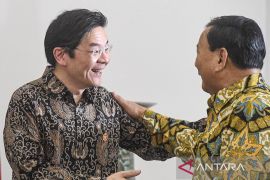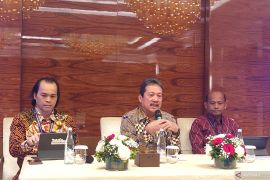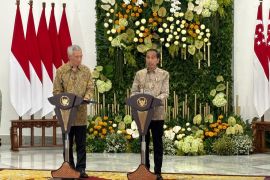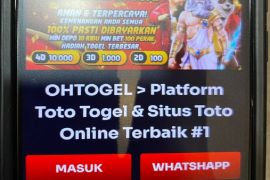"The door to imported cattle is now so widely open that it leads to a decline in the price of local cattle," Central Java Governor Bibit Waluyo said last Thursday (June 9).
The glut of imported cattle was responsible for the low price of local cattle and Australia`s decision to suspend all live cattle to Indonesia for up to six months in response to cruelty claims would give a chance to local breeders to grow, he said.
"Hopefully, the price of local cattle will improve so the local breeders` profit will increase," he said.
He said Central Java which now had a cattle population of about 2 million was gearing up for self-sufficiency in meat in 2014 and the suspension would have a positive impact on the province`s efforts to meet local demand for meat on its own.
The East Java provincial government positively welcomed the temporary ban on Australia`s live cattle exports to Indonesia announced on Wednesday (June 8) following an outcry over video footage showing inhumane treatment of cattle in Indonesia.
"We hope the ban will increase the price of local beef," Head of the East Java Husbandry Office Soeparwoko Adisumarno said last Thursday (June 9).
He said the ban would automatically increase the price of local cattle. "When a supply of cattle to the market begins to decline while demand for beef remains high the price will automatically increase."
The absence of cattle imports from Australia would reduce the supply of imported cattle to the domestic market, he said adding East Java alone now had a cattle population of 3.7 million and saw a surplus of 300 thousand almost every year.
Live Australian cattle represent nearly 40 percent of Indonesia`s beef consumption. Indonesia buys 60 percent of Australia`s live cattle exports with a value of about 330 million Australian dollars ($350 million) a year.
Former vice president Jusuf Kalla said he supported any plan to restrict cattle imports from Australia following Australia`s decision to temporarily halt live cattle exports to Indonesia.
"I think this is a good chance for us to produce more cattle," he said after addressing a national seminar "Days of Islamic Economic Revival" at Sentul, Bogor, West Java, last Friday (June 10).
He said restriction on cattle imports from Australia would not affect cattle supplies. Instead, it would encourage the domestic cattle industry to increase production in pursuit of self-sufficiency in cattle.
"There won`t be problem. We must be optimistic. Our cattle supplies are enough and we can achieve self-sufficiency in cattle," he said.
Jusuf Kalla who is also chief of the Indonesian Red Cross (PMI) expressed optimism that Indonesia would be able to meet beef demand on its own on the ground the country once exported cattle.
Cattle trader Wartono said Australia`s decision to suspend cattle exports to Indonesia would cause the local cattle trading particularly in Sleman district to rebound because it would increase the price of local cattle.
"The policy to suspend cattle exports will cause buyers to turn to local cattle and therefore, local breeders will be more motivated to look after their cattle," said Wartono who is also chief of the cattle traders association at the Jetis cattle market at Widodomartani village in Sleman district, Yogyakarta, last Friday (June 10).
He said the entry of foreign cattle caused not only the price of local cattle but also the number of local cattle trade transactions to fall. "Quite a few cattle traders suffered losses because the cattle bought at Rp5 million was sold for Rp3 million and consequently, many cattle breeders were not serious in looking after their cattle and the cattle became thin," he said.
In Sukabumi, West Java, the price of local cattle rose by up to Rp1 million each following a report that Australia would suspend live cattle exports to Indonesia.
"Normally, local cattle is priced at around Rp4 million each. But this time it can fetch Rp4.5 million to Rp5 million due to rising demand for local beef," Slamet Sutarno, a supplier of cattle to slaughterhouse in Sukabumi said last Friday (June 10).
The Sukabumi municipal agriculture and food security office said Australia`s suspension of live cattle exports to Indonesia would not have an impact on beef supplies to the city.
Beef supplies remained normal because the vast majority of local residents consumed local beef originating from Sukabumi and Cianjur districts, head of the husbandry production section at the Sukabumi municipal agriculture and food security office Ferry Nur Trisnawati said last Thursday (June 9).
"Admittedly, a supply of imported beef fell by up to 30 percent. But this has happened since a month ago and was not caused by Australia`s suspension of live cattle exports to Indonesia," she said.
Ferry said she warmly welcomed Australia`s decision to temporarily stop live cattle exports to Indonesia in what she saw would allow local cattle to become a host in its own country.
From Mamuju, West Sulawesi, Chairman of the Indonesian Cattle Breeders Association (HPI) Rudy Prayitno asked the government to reject beef imports from Australia following the neighboring country`s decision to suspend live cattle exports to Indonesia.
"The government should reject beef imports from Australia if the country suspends live cattle exports to our country," he said last Thursday.
(Uu.S012/H-NG/O001)
Reporter: by Suharto
Editor: Priyambodo RH
Copyright © ANTARA 2011











